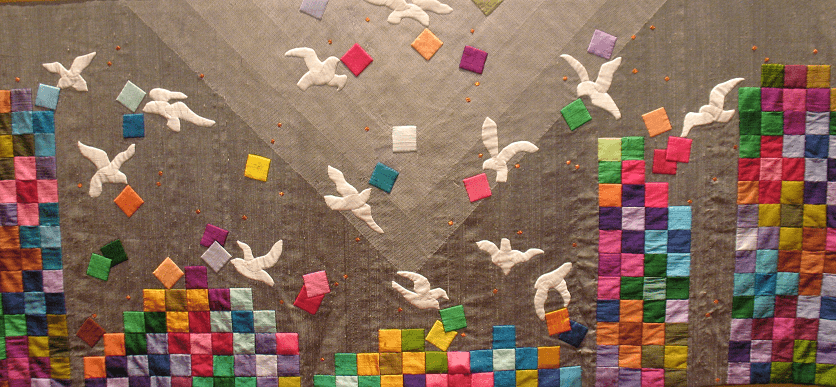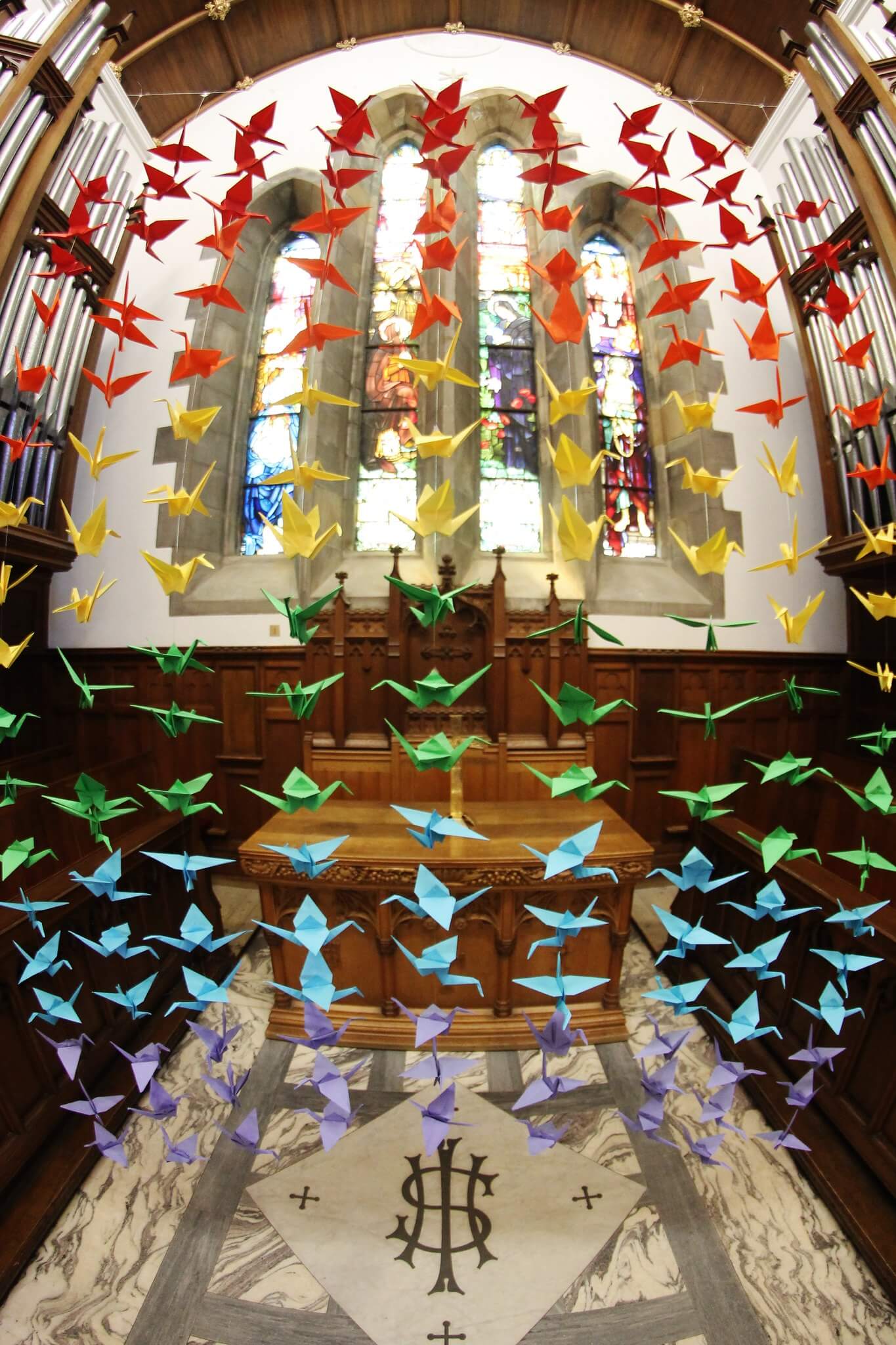 Mike Harris, in repealing the Employment Equity Act, said: only those viewed as
Mike Harris, in repealing the Employment Equity Act, said: only those viewed as
competitive deserve a job. On the other hand, in lowering the welfare rates,
he said only those who had a job deserved an adequate income. At the same he
changed the Tenant Protection Act so that people without a job or without
adequate income could be evicted for not paying their rent. Mike Harris was
violent. He forced people to live and die on the street. However Mike Harris
is not seen as violent. He is seen as upholding the values of our survival of
the fittest economy.
Victims of violence, myself included, usually respond to violence with
violence. Many of the victims of Mike Harris’ policies feel powerless,
helpless defeated, devalued and thrown away. Some escape their subsistence
lives by using suicidal addiction of drugs and alcohol
I am afraid of people who are drunk. I perceive their behaviour as being out
of control. I fear I might be physically hurt. I am vulnerable. But how much
of this fear is real, and how much of it is my projection, I do not know: it
depends on the individual. I want to run away. I want to exclude
“them”. Yet. I know in my bones the violence of exclusion. I know what
it is like to be a label, seen only as part of an unwanted group—a
‘them’. I know what it is like to be treated according to another
persons idea of who I am, rather then who I actually am as an individual
person. I know what it’s like to be left on the periphery of a community,
ignored and excluded. (Fortunately, you at Holy Trinity have gotten to know me
as a person)
Our scripture today is about inclusion. We read about an Eunuch, someone
rejected, despised and outcast by the early Christian Community.. He wants to
be baptized: he wants to belong.
Jean Vanier describes the needs of an alcoholic in his book “Be Not
Afraid.” I shall name the alcoholic John
{John} “is told that he needs to stop drinking: it’s bad for his
health. But he doesn’t need to be told that—he’s been vomiting all
day…What he wants is to find someone who will give him the force, the
motivation, the thirst for life….He needs strength, he needs to be attached to
someone who will give him life and courage, the peace and the love,. which will
help him…not to take drugs, not to drink, not to be depressed” [95]
Sara Miles, in her book “Takes this Bread” talks about the challenge of
setting up a food pantry at St. Gregory’s, San Francisco, Initially, the food
pantry was for people living in nearby housing project. But to her astonishment
it ended up a food pantry run by the people who used the food pantry.
“Just as St. Gregory’s encouraged laypeople to serve as deacons in its
liturgies, at the pantry, the people I thought of as “pantry deacons”—our
volunteers—weren’t a select or professional group….[More and more] were
unofficial; visitors who came to get groceries and then stuck around to help.
They were more often misfits; jobless or homeless or [psychiatric survivors} or
just really poor. They’d stand in line for weeks, then one day they would
ask if we needed a hand.. The next week, they’d show up early, and the next,
they’d be redesigning our system, explaining to me how things could work
better. Little by little, these new volunteers were beginning to run the
pantry.
Sara soon found that more and more her role was to listen: When someone
steals, acts out, loses there temper, there is generally a reason. Listening
involves being present; Putting aside one’s own concerns and being present
to the story on another person. It means imaging what it feels like to live
the story of another person. Not Easy..
Sara describes her experience of listening:
So I’d sit down with people and let them talk: I’d listen and put my hands
on them at some point.
…I get people like Ed, a fiftyish white guy with long hair who’d frequently
flop down on the curb, begging for help. One of our most insane and drug addicted visitors, he’d sob and
rant. In no particular sequence, about the secret lessons of First Corinthians,
his imaginary machine gun, his father and the immanence of the Day of
Judgment, the evils of the VA hospital, and his present need for healing
prayer. I’d sit down on the sidewalk with him and wipe his nose. “Oh
God,’ he’d say. “I can’t go on like this. Help me, help me.: I was
sort of fond of Ed, despite his hysteria, so I pat his stringy arm and murmur
until he calmed down a bit, then fetch a snack, make a sign of the cross on his
dirty forehead, and send him on his way with a few bags of food. (131)
As people bond together becoming community, support comes from people
unexpectedly. Sara describes;
…I was outside, trying to chat with Christa, the lady with bright pink hair.
I could hear one of our meanest drunks shouting and being nasty to people at the
end of the line. I went over and asked if he wanted food. “Hell yeah,”
he snarled. I could tell he wanted really badly to hit me.
An enormous black guy started to come over, protectively.
“I’m Dave,” he said…his voice was amused and gentle. “You need
help.” I told Dave no, it was Okay, and walked the drunk away from the line,
telling him I’d get him some food. When I came back out with the groceries,
the drunk was sitting down on the curb and he’d yanked up a handful of pansies
from our garden and was holding them out to me roots and all. “Here, he
slurred, ‘for you. I like you These are for you. [135-138]
Sara writes about the bonding of community
…Traditionally, Lent was a time of preparation for the death and rebirth of
our baptism….At St. Gregory’s, and especially at the food pantry, Lent
was embodied in my experience with others. I could feel it as more then a
metaphor: Together at the pantry, we really were turning into a people…
We were dying to our individual selves and becoming a
body. It had sore places and unhealed scars: it wasn’t perfect, but it was
beautiful. It was Christ body or…a church.. {169-170}
Sara talks about the change in Teddy one of the food pantry users and volunteers
Teddy said he’d hit bottom two years before he walked through our doors.
“I’d been up for seven days straight on meth’ he told me…and finally
crashed under the bridge where I had a little encampment. When I woke up,
there were rats crawling on me. That was the moment when something inside me
said, Get out of here and start getting help…
“But,” Teddy went on. “I came here for food, and
then I thought I could volunteer, and volunteering changed me. After all those
years of being a drug addict, living on the streets, this gave me tht sense that
there was the possibility of happiness again. Now every time I give out food
and make contact and am able to smile at somebody, even if I can’t speak their
language, I’m just really touched—I’m being fed by it. [214-215]
Teddy still had relapses and fights and weeks of almost unmanageable anxiety,
but being one of the people in charge of the pantry had become what he called a
kind of spiritual practice. He looked at me earnestly. ‘It’s very easy
for me to try to control people,” he said. “But when I’m not sarcastic
or arrogant or egotistical, I see that the qualities in people that frustrate
me are really about me. It’s not just about feeding people who come to the
pantry with food. It’s about nourishing them with love.
[246]
Sara sums up the experience of the food pantry:
“This was the hunger that first drew me to the Table at St. Gregory’s. It
was the same hunger that drew parents to the pantry to get groceries and brought
them back to blurt out
Help or thank you or some other real word. It was the hunger of the
volunteers, with their yearning for jokes, lunch, company and work to do. It
was the hunger of everyone who gave us dollar bills, cans of hominy, apples from
their backyard, huge checks… It was a hunger that had to do with the bodies of
strangers, with offering everything we had, giving away control and receiving
what we needed to live. Communion. I wanted communion
On Thursday, as I was leaving Holy Trinity, a man held the door for me. I
recognized him as one of the people living on the square. I’m sorry I
don’t know his name. I asked him;’ How are you doing?” This is the
House of the Lord, “ he replied, “I am safe here.”
Marilyn Ferrel






